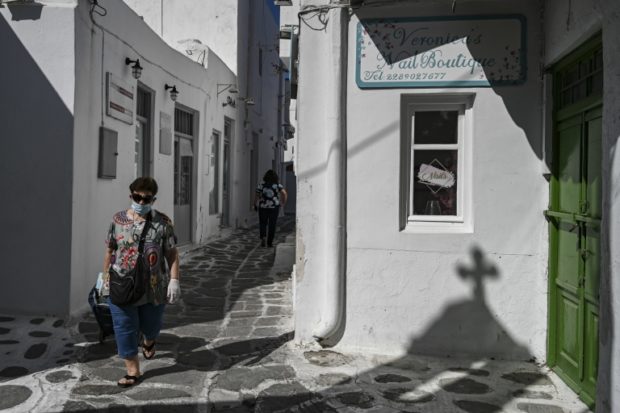From mecca to ghost town, Mykonos awaits tourism relief

A woman wearing a protective face mask walks in the alleys of the Greek Cycladic island of Mykonos. Image: AFP/Aris Messinis
Seated on stone steps beside his Mykonos souvenir shop, Nikos Degaitis has for decades watched round-the-clock tourist crowds snake through the iconic Greek island town’s labyrinthine alleys. Until now.
“I’ve never seen such desolation,” the 86-year-old told AFP.
The lodestone of Greece’s travel season alongside Santorini, Mykonos has paid the price of the coronavirus lockdown like the rest of the tourism-dependent country.
“We feel like in a ghost town. No one is walking around, it’s very scary now,” says Lorraine McDermott, an Irishwoman who has lived on the island for nearly three decades.
“Usually it’s crowded, there are sounds, music, traffic is tremendous,” says McDermott, who rents rooms in the picturesque port town with her Greek husband.
The island depends on tourism for 80% of its livelihood, she notes.
Most Greek businesses were shut down in March after the country recorded its first COVID-19 death, and travel to the islands was restricted in a six-week clampdown that has only recently begun to be eased.
Greek officials have announced that normally year-round hotels and restaurants are to resume operation on June 1 with strict distancing rules. Other tourist resorts are expected to open on June 8, Greek health minister Vassilis Kikilias said Thursday.
But many operators here, like in the rest of the country, are wondering whether it is worth resuming business at all under such strict rules.
‘Scared to serve’
“Even if I open up, I will be scared to serve and help customers,” says Degaitis, who has run his souvenir shop for 65 years.
“I can’t stand this sort of thing, wear a mask, keep two metres (apart), it’s better that the shop is closed and for me to go to bed,” he adds.
“The rules are too tough, all the routines will change, how does one respect the rules in such a tiny street?” wonders his grandson George Dasouras.
In April, the Hellenic chamber of hotels said the sector calculated a 4.46-billion-euro ($4.9-billion) loss of revenue because of the virus this year, with over 45,000 jobs at risk.
Last year, some 700,000 people were employed in the Greek tourism sector overall between June and September.
On Paradise, one of Mykonos’ world-renowned beaches, turtledoves have replaced the dusk-to-dawn scrum of tanning bodies.
“Last year, we had 600 to 700 sunbeds. As far as things stand today, we don’t even have one,” says Damianos Daktilidis, owner of the Tropicana beach club.
“I have not calculated the percentage of losses, we don’t want to calculate, we hope that the year will be salvaged from July (onward),” he adds.
Prime Minister Kyriakos Mitsotakis has said that the “best-case scenario” is for Greece to “open for business” from foreign travellers on July 1.
‘Bring people safely’
“We will find a way to bring people over safely. I estimate it will be a totally different story from late July,” the premier told store owners in Athens on Thursday.
Greece wants to capitalize on its relatively slow spread of the virus compared to other European countries.
As of Thursday, the death toll stood at 156 in the country of 11 million. Out of over 2,700 cases, just two were on Mykonos.
“We are at a better starting point than other countries to receive a large number of tourists… nobody knows how many. Naturally, this summer will not be like the previous one,” government spokesman Stelios Petsas said Thursday.
The European Union this week said holidaymakers could be asked to wear face masks on planes, respect social distancing on the beach and even book slots to use hotel pools.
“A lot will depend on how many customers we have. What if there’s a (virus) incident inside the hotel?” says hotelier Vassilis Theodoropoulos, noting that it will hardly be worth reopening his business only to shut it down every time there is an outbreak.
The Greek government has announced a support package of around 24 billion euros, including EU funds, to help shore up the economy.
With tourism accounting for 12% of national output, Greece is expected to sink into a 10% recession this year, according to the International Monetary Fund.
The Greek finance ministry says the downturn can be limited to 4.7%, but the jobless rate will approach 20%.
“We’re living day by day, I believe we’ll only have August, September, October. July will be very slow,” says McDermott. “I’m afraid Greece is going to go back 10 years (in economic terms). It will take a few years before we come back on our feet.” JB
RELATED STORIES:
Hotel buffets on the chopping block in post-coronavirus travel
For more news about the novel coronavirus click here.
What you need to know about Coronavirus.
For more information on COVID-19, call the DOH Hotline: (02) 86517800 local 1149/1150.
The Inquirer Foundation supports our healthcare frontliners and is still accepting cash donations to be deposited at Banco de Oro (BDO) current account #007960018860 or donate through PayMaya using this link.